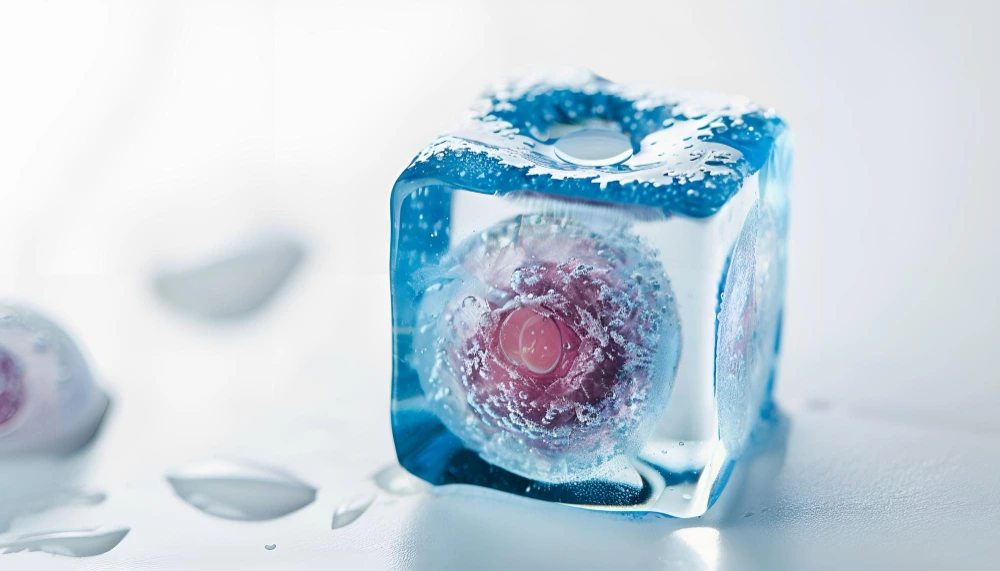What if you could store your most viable embryos and keep them safely until you feel it is the right time to have them? This is precisely what embryo freezing- or cryopreservation -provides. It is one of the strongest gifts of modern embryology: to hold possibility intact.
Embryo freezing is not a backup strategy. It is a gorgeous, empowering choice for all those who undergo fertility treatments, plan their future as a family, or freeze their biological time. So, how does freezing work, when is it beneficial, and what is making a difference in people’s lives every day?
What Is Embryo Freezing?
Embryo freezing refers to the procedure of preserving embryos under very low temperatures (approximately -196 °C) by a technique termed vitrification. Embryos are then stored in liquid nitrogen after they have been frozen, and they can be stored for years, and their genetic integrity is not affected.
Once the patient is ready, months or years later, the embryo is thawed and inserted into the uterus. It is as though you started your potential music again.
Why Do People Freeze Embryos?
To Build Families Later
But sometimes, life is just not ready yet; careers, finances, health, or relationships may require time. Embryo freezing has also provided individuals with the opportunity of postponing pregnancy to have younger and healthier embryos in future..
As Part of IVF Treatment
In IVF, several embryos are usually produced and not necessarily used in the same cycle. The preservation of the remaining embryos spares the patients the need to go through the complete stimulation cycle again.
For Medical Reasons
Cancer patients, people undergoing surgery, or other medical operations that have the potential to impact fertility usually take the option to freeze embryos in advance. It provides security when things are out of control.
To Prepare for Genetic Testing
A biopsy may be done on embryos, and they may be frozen as they await the results of preimplantation genetic testing (PGT), and only the healthiest ones will be transferred later.
How Vitrification Changed the Game
Conventional slow freezing commonly caused the formation of ice crystals, which killed cells and caused embryos to die. However, in vitrification, the embryos are cooled down so fast that no ice crystals can form; instead, the embryo becomes a glass-like solid within a second.
Such an approach has:
- More than 95 per cent survival post-thawing
- The same (occasionally superior) pregnancy rates as fresh embryos
- Made freezing a primary option, not a secondary option
Benefits of Freezing Embryos
Gives You Multiple Chances at Pregnancy
Your repetition of egg retrievals may not be necessary every time you want to have a child because you have frozen embryos available. This simplifies further cycles, makes them less intrusive, and cheaper.
Reduces Risk in Stimulated Cycles
During IVF, some women are at risk of Ovarian Hyperstimulation Syndrome (OHSS). In this situation, physicians can choose a freeze-all approach and be able to save and freeze embryos and then transfer them at a later date when the body is stable.
Enables Better Planning
Embryo transfers can be performed in natural or controlled hormone cycles with improved flexibility and uterine lining synchronisation with frozen embryo transfers (FETs).
Lower Risk of Multiple Pregnancies
Frozen embryo transfer provides the opportunity of single embryo transfer, commonly recommended by the clinics to avoid twins or triplets, and also healthier pregnancies.
Suggest to Read :- Day 3 vs Day 5 Transfer: What’s the Big Deal?
How Long Can Embryos Be Frozen?
Embryos may be stored up to 5-10 years or more, depending on local law and also on the biological longevity of storage. Embryos that were frozen more than ten years ago gave birth to many healthy babies!
Embryos do not age in the freezers; their clock freezes. That is what makes this option powerful.
Are There Risks?
Like any medical procedure, some considerations accompany embryo freezing:
- The thawing process does not result in the survival of all embryos (though most with vitrification)
- There are freezing and storage costs that may be incurred
- Every frozen embryo will not get pregnant
Emotional Perspective: Why It’s Beautiful
Embryo freezing is not only science, but self-care, foresight and hope.
To most people, there is a specific relief in knowing that embryos will be frozen successfully:
- Reduction of time pressure
- Domination of unpredictable courses
- The hope to survive after complex IVF cycles
- Ease in problematic medical circumstances
It is a silent power- the knowledge that you have taken back options, opportunities, control over your fertility.
In Conclusion
Freezing of the embryos can be regarded as one of the most encouraging inventions in reproductive medicine. No matter why you are going through IVF, have a medical condition or are just not yet prepared to parent, this option keeps your future open.
Here at www.embryologist.co.in, we do not view frozen embryos as a number in the freezer but as a future smile, as a story and as a beginning, just waiting to find the right time.
There are times when the best things in life are worth waiting for. And now with science aiding you, you need not be in a hurry with your miracle.



